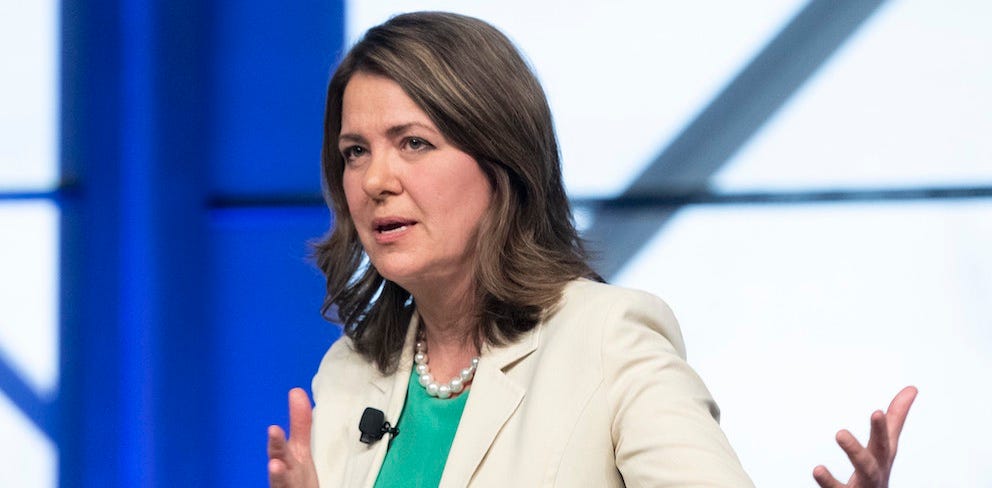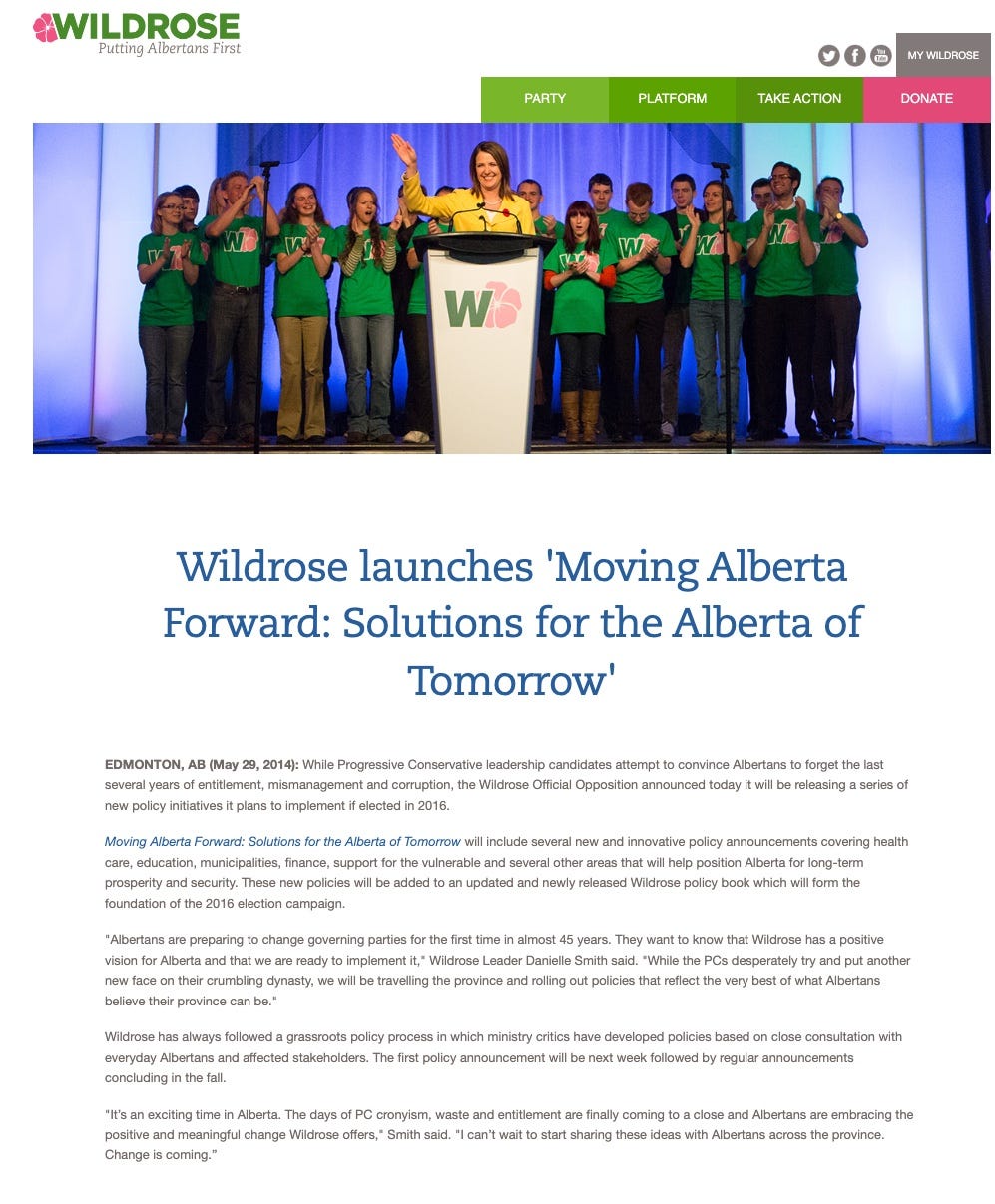NDP and UCP trying to define each other on health care and crime
Despite the best the laid plans, elections are unpredictable
I’m Dave Cournoyer and this is the Daveberta Substack.
Thank you to everyone who has subscribed and shared feedback on my last post and latest podcast (we’re planning to release a new podcast next week). If you like what you read here today, please leave a comment below and share this column with a friend or colleague.
Thanks,
Dave
tl;dr
If you don’t have time to read today’s column right away, here are some of my main points:
With 39 days left until Election Day in Alberta, we are getting a pretty good idea of how the United Conservative Party and Alberta NDP are trying to define each other.
Rachel Notley’s NDP are putting a big focus on health care in their campaign and are using Danielle Smith’s own voice in their ads targeting the UCP leader.
Smith’s UCP is focusing on crime and social disorder and are running ads targeting NDP MLAs and candidates for using what the UCP describes as anti-police comments.
Maybe the most overlooked result of Janet Brown’s recent Calgary-focused poll was the 40 percent who chose the NDP and 28 percent picked the UCP when asked which party would be a more honest government.
The parties will do everything they can to shape the narratives of the election campaign but, as anyone who has followed a campaign knows, elections are unpredictable and can sometimes produce very unexpected results.
Today’s column
NDP and UCP trying to define each other on health care and crime
With 39 days left until Albertans elect a new government, we are getting a pretty good sense of how the two main political parties are trying to define their opponents in the minds of voters.
To no one's surprise, both the United Conservative Party and the Alberta NDP are trying to play to their own strengths and their opponents weaknesses.
NDP on Health Care
Rachel Notley’s NDP have put health care front and centre in their pre-election campaigning and have made what feels like a dozen health care funding promises over the past month.
Health care was the biggest issue on the minds of voters surveyed in respected pollster Janet Brown’s Calgary-focused poll released by CBC last week. Brown’s poll showed 45 percent of Calgarians polled named health care as their top issue in this election.
The poll also showed that 47 percent of Calgarians believed the NDP were best able to handle health care, compared to 35 percent for the UCP.
That’s probably a big reason why Calgarians are seeing and hearing a lot of NDP ads featuring the voice of UCP leader Danielle Smith asking if the cost of a simple visit to the doctor should be 100 percent covered by the government. Smith’s comments come from a video interview she did after the release of a policy discussion paper she wrote for the University of Calgary School of Public Policy in June 2021.
Arguing in the paper for individual Health Spending Accounts (an idea she championed during her campaign for the UCP leadership but has stopped talking about ahead of the election), Smith wrote that “once people get used to the concept of paying out of pocket for more things themselves then we can change the conversation on health care.”
That’s a pretty clear indication that at the time Smith was trying to push the conversation towards Albertans paying more out of pocket for health care services.
Standing behind a podium fitted with a familiar “Public Health Guarantee” sign last week, Smith claimed the NDP was “lying to Albertans” and engaging in “fear and smear.” But the NDP were using words that came out of Smith’s own mouth. It wasn’t even taken out of context.
The UCP does not have a good track record managing the health care system, but that hasn’t stopped them from trying to steal some of the NDP’s thunder with the government’s health care-themed “Help is on the way” advertising campaign. The UCP knows health care is on the minds of Albertans and while they can’t beat the NDP on it, they will try to minimize the NDP’s advantage.
UCP on crime and social disorder

The UCP is trying to draw voters' attention to other issues: crime and social disorder.
It might not be one of the biggest issues on people’s minds ahead of the election, but Brown’s poll showed that 45 percent of Calgarians believed the UCP were best able to reduce crime compared to 29 percent for the NDP. So it’s no surprise the UCP would play to what they perceive as their strengths.
Standing in front of a crew of fellow UCP candidates earlier this month, Calgary-Shaw MLA Rebecca Schulz released of a series of attack ads targeting NDP MLAs and candidates who used what the UCP describes as anti-police comments.
The move is an attempt to weaken the NDP’s support in suburban areas by branding the party’s candidates as radically opposed to law enforcement.
Some of the quotes used in the UCP ads were wildly out of context.
When Edmonton-Whitemud NDP MLA Rakhi Pancholi said "I'm all for spending less money on our criminal justice system,” she was agreeing with UCP cabinet minister Sonya Savage during a debate in the Legislature about streamlining traffic ticket dispute mechanisms.
But that’s politics.
No one will deny that there are significant social problems facing the urban cores of Alberta’s two largest cities. Take a walk down any street in downtown Edmonton and you will undoubtably come across people facing mental health or addictions challenges. It’s sad. It’s bleak. Downtown Edmonton has always been a little rough around the edges but it didn’t feel like it was this bad four years ago before the UCP was in government.
The NDP had been pretty silent on the issue until this week when Calgary-Bhullar-McCall MLA Irfan Sabir and Calgary-Buffalo MLA Joe Ceci released their party’s plan, which focuses on restoring municipal police funding and hiring more officers and support workers.
Calgary-West UCP MLA Mike Ellis shot back with criticism of Notley for not attending her party’s press conference and accusing the NDP leader of not wanting to answer questions about the quotes featured in the UCP attack ads.
Meanwhile, Globe & Mail journalist Alanna Smith is reporting that the UCP is considering introducing a law that would give the government more power to place severe drug addictions into treatment without their consent. Experts are rebuking the idea and calling it “incarceration rebranded.”
I expect we will hear a lot more about this from the UCP over the next few weeks.
Honesty
But perhaps the most overlooked result of Janet Brown’s poll was when asked which party would provide a more honest government, 40 percent chose the NDP and 28 percent picked the UCP.
It’s a stunning turnaround from four years ago, when Notley’s NDP were not popular in Calgary. Those results say a lot about Notley’s own skills as her party’s leader and a even more about the UCP’s record in government that Calgarians will admit to feeling that way.
Elections can be unpredictable
The parties will do everything they can to shape the narratives of the election campaign but, as anyone who has worked on a campaign knows, elections can take a life of their own. Sometimes the big issue during the first week of the election feels like ancient news when voting day comes around.
I bet that ten years ago most Albertans would have struggled to remember what the big issue was during the first week of the 2012 provincial election.
It was the now long-forgotten No-Meet Committee (don’t you remember?).
By the last week of that election the three words on the minds of many Albertans were: Lake of Fire.
It was an incredible turn of events and an important reminder that, despite the best the laid plans, elections are unpredictable and can sometimes produce very unexpected results.
One more thing…
Blast from the past: UCP resurrects Wildrose Party campaign slogan
There was a bit of a blast from the past last week when the UCP released their election campaign slogan and logo: Moving Alberta Forward.
If the slogan sounds familiar, that’s because we’ve heard it before. Then-leader of the Wildrose Party Danielle Smith launched it as her party’s pre-election campaign slogan on May 29, 2014. But the slogan was never used in the following election because a few months later Smith and most of her Wildrose MLAs crossed the floor to join Jim Prentice’s Progressive Conservatives.
Elections Alberta releases 2022 annual fundraising reports
Elections Alberta released the 2022 annual financial disclosures from the provincial political parties, giving Albertans a glimpse into how much money the parties raised and had left in their bank accounts at the end of last year.
The UCP reported total annual revenue of $7,810,528.05 in 2022, with $5,969,244.42 in expenses and $2,947,517.00 net assets at the end of 2022.
The NDP reported total revenue of $7,605,640.87 in 2022, with $7,612,673.02 in expenses and $5,514,176.00 net assets at the end of 2022.
And yesterday, the UCP announced the party raised $4 million in the first quarter of 2023.
With UCP and NDP coffers filled to the brim, this is going to be the biggest spending provincial we’ve ever seen in Alberta.





Thank you, Dave - always valuable. Two points. You note that elections are often surprising, so here is my thought about what could really surprise almost everyone. So many voices are saying what Rabin Mohamed just wrote in the National Post: “one thing that’s all but guaranteed is that election night will be a nail-biter”. I believe that elections often crystallize public opinion in one direction or another. If Smith wins, the margin may seem modest (but could still be 47-40). If Notley wins, my bet is that she will win 50+ seats (say, 51-36). Why might that happen? Likely, that trust gap that you describe could have a big coalescing impact. Of course, even in that case, the vote percentage margin could remain pretty narrow, due to differing vote efficiencies. But on election night, a 15 seat margin would not seem close at all.
Second point is more a handful of questions. Don’t the huge sums of money that have poured in mostly matter in this pre-election period (which is almost over)? And has either party outgunned the other in ad spending up till now, or produced much more effective messaging? During the election itself, don’t strict limits constrain the parties from spending all the money they have on hand? And since the election results (and swing ridings) will mostly centre on Calgary and the donut around Edmonton, won’t advertising and ground game dollars spent there quickly reach a (saturation) point of diminishing returns?